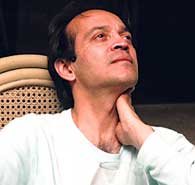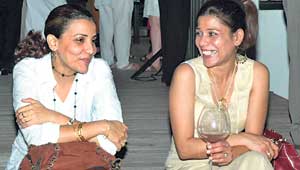
LIT BLITZThis weekend, you would have been forgiven for thinking that all roads had suddenly changed course and led directly to Galle.People came in cars and vans, by train and bus; literally hundreds converged on the sleepy little seaside town, determined to participate in what may already have become established as the event of the new year -the Galle Literary Festival 2008. The launch on Wednesday was held in the large open space of the Law Court Square. Kandyan and low-country drummers welcomed participants and guests from all over the world. Entrepreneur and hotelier Geoffrey Dobbs, in his role as founder of the festival, expressed the hope that the Galle Literary Festival “would highlight the great depth and diversity of English writing originating here in Sri Lanka”.
That all this is happening within the stately beauty of Galle Fort – a UN World Heritage site – is in itself probably the single most appealing aspect of the festival. For Sri Lankans who love their English literature, events like this tend to be few and far between. This time around, the Galle Literary Festival seems to have doubled in size. Certainly anticipation was running high during the launch. It did help that scattered among the listening crowd were several familiar faces. Standing with friends, Shyam Selvadurai kept well to the back of the group. Vikram Seth wandered around, carrying a shopping bag, occasionally pausing to speak with an admirer. Nury Vittachi sat smiling in the first row. Seated in a place of honour, Gore Vidal watched the proceedings from the stage. Many of these authors seemed glad to be at the event –not least because they could finally meet each other. Remembering having received a weighty manuscript called A Suitable Boy many years ago by a relatively unknown Indian author, Gore Vidal said that he was looking forward to making the acquaintance of the now-popular Vikram Seth. In fact, a surprisingly diminutive Vikram seemed to be very much in demand. Speaking with Karen Roberts, Sri Lankan author of The Flower Boy and July at a cocktail party later in the evening, we discovered that she, like several others, had finally spoken with the man himself. Unfortunately, the author had refused to give any interviews. Explaining that he is uncomfortable with discussing himself and bored with discussing his work, Vikram was nevertheless approachable, speaking with whoever could muster up the courage to introduce themselves, and autographing copies of his books and poems. When it became too much for him, he disappeared, wine glass in hand, into a corner with Shyam. Around them, the party went on unabated till late in the night.
It was that kind of event, made even better because for people like Karen this is a long-awaited homecoming. Speaking of the flood of criticism that her novel July generated, the author said she's been wary of coming back. That evening, seated casually beside her sister on the edge of the platform and tucking into what she swore were the best vaddais ever, she said quite simply that she was just glad to be home. Simply Gored! Somewhere between Los Angeles and Colombo, they managed to lose Gore Vidal's luggage. When I finally get to meet him, he is still annoyed by the loss of his Versace wardrobe, and not in the least inclined to be talkative. Luckily, I'm prepared. Even so, my ten minutes with this iconic author, activist, actor, critic, analyst and screenwriter is nerve-wracking to say the least. He can be scathing, and he sharpens his legendary wit on everything from his accomodation to journalists he has met, into the ranks of whom I am now being inducted. I wade into the deep end with a question about the upcoming 2008 U.S. Presidential elections. After all, he has always had an abiding interest in politics, having taken on the role of not only activist and analyst but candidate as well. As a member of a group that would like to have the current U.S. President, George W. Bush, impeached and tried for crimes against humanity, one would think Mr. Vidal might be somewhat glad to see the man step down. But then one could be wrong. Though Bush might be on his way out, Mr. Vidal sees no reason to be unduly optimistic. “Corruption in the United States, political corruption, is so total it would take several generations to undo it,” he says repressively, and we are soon back on the subject of his luggage. I try again. Wondering whether his move from Italy to Los Angeles has given him a fresh perspective on his homeland's politics, I am told that he has several homes, but that this does not mean he lives in them. “What you are talking about is little professors with very little income,” he says, “You know, the ones with five dollars a month, and they have a little house somewhere and they live there, and they teach school –and I'm not that person.” And we're back on the subject of his luggage. This time he says quite firmly that when he was here 20 years ago, things were much better. Rather hopefully, I ask him what brought him here then. He responds – “I don't need a reason to be here... I don't take vacations.” Something as pitiful as a “three-month vacation,” he tells me, once again belongs in the domain of the little professors. The trials and tribulations that seem to be in his opinion the province of poverty-stricken academics find no place in his life. Not surprising, really, when you consider that Mr. Vidal has been publishing since he was 19, and over the decades has become famous not only for his numerous novels –of which there are more than two dozen– but for his essays and plays as well. Beginning with The City and the Pillar, Mr. Vidal has seemed to delight in provoking his readers. In fact, The City and the Pillar, in which he dealt openly with homosexuality, was both his first successful book and his first major controversy. With enviable confidence, he says that the criticism has never bothered him in the least. “I am a writer because I write, there's no other reason for it,” he says, going on to dismiss his success as easily. “I don't have a magic formula,” he says, “And even if I did, I don't believe I would tell anyone.” We talk a little while more –about why he has rewritten several of his early novels (“Our greatest novelist did that all the time, and his name was Henry James, not Hemingway”), and about his current project (“I'm working on the last play that Tennessee Williams ever wrote. I'm preparing it for production on Broadway.”) However, we have to stop soon – He has a lunch to attend. Ruefully, I look at my list of questions, many of which are still unanswered; but I've already realised that when it comes to Gore Vidal, you take whatever you get. I pack up my recorder and notes. Finally, he smiles briefly at me. As we leave, he remains in his wheelchair, staring out at the ocean. One can only hope that they find his luggage soon. |
|| Front
Page | News | Editorial | Columns | Sports | Plus | Financial
Times | International | Mirror | TV
Times | Funday
Times || |
| |
Reproduction of articles permitted when used without any alterations to contents and the source. |
© Copyright
2008 | Wijeya
Newspapers Ltd.Colombo. Sri Lanka. All Rights Reserved. |


